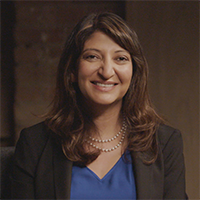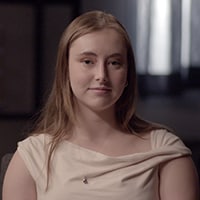Transcript
This transcript has been edited for clarity.
Ruchi Gupta, MD, MPH: Hi. I'm Dr Ruchi Gupta. I'm the director of the Center for Food Allergy and Asthma Research at Northwestern University and Lurie Children's, and I am so excited to be here having a Care Cues discussion with Cate Weiser. She is a rising junior at The University of Chicago and has had food allergies all her life.
Welcome, Cate.
Cate Weiser: Thank you. It's so great to be here chatting with you today.
Gupta: Can you tell us about your initial diagnosis for food allergies? How did all that happen?
Weiser: I've had food allergies for as long as I can remember. I was diagnosed when I was, I think, 4 months old. I had eczema first, according to my parents. That was when I was very young, like, newborn.
Gupta: And we know that eczema is the number-one risk factor for developing food allergies and that early eczema is the sign. We call it the atopic march. You don't have to have all those conditions, but you have a higher chance of having them, and you got all of them, so you have a lot of knowledge about those.
Weiser: I was always taught self-advocacy. It was drilled into me, like, nuts are dangerous. That really helped me when I was younger to understand the severity of the situation, and having to be really aware of my surroundings as I was growing up. I'm certain that those lessons did come from my provider and from my parents.
Gupta: Yes. And those are so important.
Weiser: I've outgrown some throughout my life, but currently I am allergic to eggs, peanuts, tree nuts, and fish.
Gupta: Which ones have you outgrown?
Weiser: I have outgrown sesame, dairy, soy, gluten, and shellfish. I think that's all of them.
Gupta: Wow. That's quite a few. That's good. Some of those are really important to outgrow.
Weiser: Lots of changes.
Fostering Age-Appropriate Communication
Gupta: You get to high school where now you're wanting to go out and do things on your own. I get a lot of kids in that age group that would like to talk to me independently of their parents, privately, to discuss challenges they're having. When did that happen for you and how did that go?
Weiser: So, I was in eighth grade and I had a boy that I liked, and I really was hoping to have my first kiss. And this is very embarrassing for me to talk about, so bear with me. Nobody had talked to me about it at this point, but obviously it makes sense that if I'm going to be kissing somebody else, I need to be worried about what they have eaten that day. So, I was like, I need to email my allergist. I need to talk to him. I asked my mom, "Can you please give me his contact information?" And she was like, "Okay, why don't I just call their office?" And I was like, "No, no, no, I need to do it."
So I sent him an email and I don't even remember exactly what I asked him, but it was something like, "I think I might have my first kiss soon. I want to know how to do this safely. What do I need to be thinking about? What do I do?" It was just going to be a little peck on the lips, but he was like, "Just make sure they haven't had anything you're allergic to within 4 hours."
But that was definitely the moment where I transitioned to feeling like I need to be speaking with my provider one-on-one.
Gupta: Absolutely. And we see that a lot. When patients get into high school, it's a lot of private conversations about dating and kissing and eating out with their friends. Going to parties is a big one, and drinking; how do you navigate that and how do you stay safe?
Those are some of the harder conversations that we end up having and which you have to have with the parents, because the parents have to know, and they're scared of it. But when you role-play, when you're in those situations — people are pushing you to have this drink. Take it, hold it, put it down; you know, nobody really cares if you drink it. But if you're like, "No, no, no," then they become aware, right? We get into a lot of these little tips.
Everyone is different and everyone is unique, so I think tailoring your conversations to what is important to you is the most critical thing, and giving a little insight into what may be coming and what are you going to do in those situations.
Communicating Through Life Transitions
Now that you've gone to college and transitioned on, how do you keep that dialogue open and make sure you always have your provider's input?
Weiser: It was during the transition to college, mostly during senior year, when my allergist and I would chat a lot about what the next year was going to look like: How do I get the appropriate accommodations that I need, how do I safely manage eating in a dining hall?
I was getting my allergy shots at that point once every week. If he didn't have a patient, we would chat in the waiting room, and he'd walk me through all these different concerns that I had and things that he thought I needed to know about managing my allergies. That was super-valuable for me and overall made me feel a lot more comfortable.
COVID played into this a little bit. I really didn't eat out at all in high school, partially because of anxiety but also because of COVID restrictions. I really developed pretty severe anxiety around eating food that was not prepared by me or my mom or my dad in my house. So, he set me up with a therapist who specialized in food allergy–related anxiety. I met with her throughout the summer before transitioning to college, before moving. She was really helpful as well, and my allergist put me in contact with the right physician to help me establish some tools to deal with that anxiety. Since then, it's gotten much better. Now I love eating out. I love going to dinner in the city. There's so much good food.
Maintaining Connection
Weiser: Could you talk a little bit about how you open up that door for your patients and how you let them know that you're there for them?
Gupta: Absolutely. I think your provider does everything I try to do. Having a child with food allergies has really helped me because I can relate, and I think that really does help me open the door. I know how hard this is. It is really important, even though you're fearful and anxious, that the whole family get treated and learn the tools that they need, because food is everywhere, and it is a very scary thing. Sometimes it's really challenging because I see my patients maybe only once a year.
Weiser: Yes.
Gupta: As you get older, they start skipping visits. So, how do I keep that communication open with my patients, and how do I make sure they know that I'm here for them? Are there easier ways now?
Weiser: I think it's having resources given to you by your provider. My provider gave me the link to FARE's website, which is Food Allergy Research & Education, and other resources as well, to look at all these different things almost like how they do in health class. Like in middle school, they give you a huge list of websites you can go to. And that was super-valuable for me — just to hear other young people with food allergies talking about their experiences. It's leaving that door open for communication. I think that is super-valuable because you can't make anybody talk to you.
Gupta: Having a list of resources, which we do, is very important because then you have it when you're ready for it.
Weiser: Yes.
Gupta: And finally, what's so exciting is that I get to talk to them about potential treatments because we now have them. So, we discuss the options out there. Some are harder for certain patients and some are easier, and it depends on your age group.
Weiser: I do feel like I know what all my options are and it's now just up to me to decide.
Gupta: It's just great to have options.
Weiser: Yes, so wonderful.
Gupta: And to have the ability to have those conversations. I feel like it's just going to keep getting better. Thank you, Cate, for joining me today. This has been such a wonderful conversation.
Weiser: Yes, thank you so much for having me, Ruchi. This was wonderful.
Medscape © 2024 WebMD, LLC
Any views expressed above are the author's own and do not necessarily reflect the views of WebMD or Medscape.
Cite this: Fostering Effective Communication With Food Allergy Patients, From Childhood to Adulthood - Medscape - Jun 24, 2024.










Comments